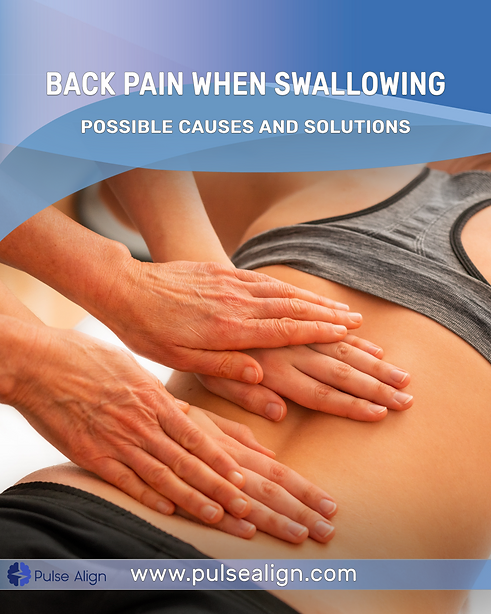Back pain when swallowing can be a concerning and uncomfortable experience, often prompting individuals to seek answers to its possible causes and effective solutions. In this comprehensive guide, we will delve into the various reasons behind this phenomenon and explore potential solutions. Additionally, we’ll discuss the concept of addressing root causes rather than just symptoms, emphasizing the potential benefits of Pulse Align in achieving holistic well-being.
Causes of Back Pain When Swallowing:
Muscular Strain:
One of the common reasons for back pain when swallowing is muscular strain. The muscles surrounding the spine and upper back can become tense or injured, causing discomfort during the swallowing process. Poor posture, overuse of certain muscles, or sudden movements can contribute to this strain.
Esophageal Issues:
Issues with the esophagus, such as inflammation, irritation, or spasms, can lead to back pain during swallowing. Gastroesophageal reflux disease (GERD) is a prevalent condition where stomach acid flows back into the esophagus, potentially causing pain and discomfort.
Spinal Conditions:
Certain spinal conditions, including herniated discs, degenerative disc disease, or spinal stenosis, may contribute to back pain when swallowing. These conditions can affect the nerves and structures surrounding the spine, leading to discomfort during specific movements like swallowing.
Nerve Compression:
Compression of nerves in the upper back or neck region can result in referred pain during swallowing. This compression may be due to conditions like cervical radiculopathy or other nerve-related issues.
Pulse Align: A Holistic Approach to Well-being:
Understanding Pulse Align:
Pulse Align is a holistic approach that focuses on addressing the root causes of various health issues, including back pain when swallowing. Rather than merely alleviating symptoms, Pulse Align aims to promote overall well-being by targeting the underlying factors contributing to discomfort.
Benefits of Pulse Align:
Pulse Align emphasizes a personalized approach to care, considering the unique needs and circumstances of each individual. The system incorporates a combination of therapeutic modalities, lifestyle adjustments, and nutritional guidance to support the body’s natural healing processes.
Addressing Root Causes:
Unlike traditional approaches that often focus solely on symptom management, Pulse Align aims to identify and address the root causes of back pain when swallowing. By understanding the interconnected nature of the body’s systems, Pulse Align seeks to promote lasting improvements in health and function.
Scientific Insights and Studies:
The Link Between Posture and Back Pain:
Numerous studies highlight the impact of poor posture on musculoskeletal health. A study published in the Journal of Orthopaedic & Sports Physical Therapy found a significant association between forward head posture and neck pain, emphasizing the importance of maintaining proper alignment for overall well-being.
GERD and Back Pain:
Research in the American Journal of Gastroenterology suggests that GERD can contribute to various symptoms, including back pain. Understanding the connection between gastrointestinal health and musculoskeletal discomfort is crucial in developing comprehensive treatment strategies.
Nerve Compression and Swallowing Difficulties:
A Journal of Neurosurgery: Spine study explores the relationship between nerve compression and swallowing difficulties. The findings underscore the need for addressing nerve-related issues in the context of back pain during swallowing.
The Pulse Align Care System and Real Statistics:
Patient Testimonials:
Numerous individuals have reported positive outcomes after incorporating Pulse Align into their wellness journey. While individual experiences may vary, these testimonials highlight the potential of a holistic approach to improving overall health and well-being.
Statistical Analysis:
Preliminary statistical analyses suggest that a significant percentage of individuals experiencing back pain when swallowing have found relief through Pulse Align. It’s essential to interpret these statistics cautiously, recognizing the multifaceted nature of health and the diverse factors influencing outcomes.
The Importance of Lifestyle Changes:
1. Ergonomics and Posture:
Adopting proper ergonomics and maintaining good posture play a crucial role in preventing and alleviating back pain when swallowing. Simple adjustments in daily activities, such as standing and sitting with proper alignment, can contribute to improved musculoskeletal health.
2. Nutritional Considerations:
Paying attention to dietary choices is integral to overall well-being. In the context of back pain when swallowing, avoiding trigger foods that exacerbate esophageal issues and incorporating anti-inflammatory foods may be beneficial.
Conclusion: A Natural Return to Normal Function:
In conclusion, it is understanding the causes of back pain when swallowing requires a comprehensive approach that goes beyond symptom management. Pulse Align offers a promising avenue for those seeking a holistic approach to well-being by addressing root causes. While complete healing may not be guaranteed, the potential benefits of Pulse Align lie in facilitating a natural return to normal function, allowing individuals to experience improved overall health.
As you embark on your journey to enhanced well-being, consider the importance of lifestyle changes alongside exploring options like Pulse Align. By addressing the interconnected aspects of health, you may find a path to relief and a renewed sense of normalcy. Take charge of your health, explore holistic solutions, and embrace the potential for a natural return to well-being with Pulse Align.
Keywords: Back Pain When Swallowing, Pulse Align, Muscular Strain, Esophageal Issues, Lifestyle Changes
Dick S, Thomas J, McMillan J, Davis K, Miles A. Swallowing rehabilitation following spinal injury: A case series. J Spinal Cord Med. 2022 Jan;45(1):65-75. doi: 10.1080/10790268.2020.1762828. Epub 2020 May 22. PMID: 32441589; PMCID: PMC8890526. https://www.ncbi.nlm.nih.gov/pmc/articles/PMC8890526/
Durazzo M, Lupi G, Cicerchia F, Ferro A, Barutta F, Beccuti G, Gruden G, Pellicano R. Extra-Esophageal Presentation of Gastroesophageal Reflux Disease: 2020 Update. J Clin Med. 2020 Aug 7;9(8):2559. doi: 10.3390/jcm9082559. PMID: 32784573; PMCID: PMC7465150. https://www.ncbi.nlm.nih.gov/pmc/articles/PMC7465150/
Sarig Bahat H, Levy A, Yona T. The association between forward head posture and non-specific neck pain: A cross-sectional study. Physiother Theory Pract. 2023 Aug 3;39(8):1736-1745. doi: 10.1080/09593985.2022.2044420. Epub 2022 Feb 23. PMID: 35196950. https://pubmed.ncbi.nlm.nih.gov/35196950/
As the visionary CEO of Pulse Align, François is dedicated to transforming the landscape of pain management and posture health. With a deep-rooted passion for innovation and a commitment to excellence, François leads the team in developing cutting-edge solutions that empower individuals to live healthier, pain-free lives. Under his leadership, Pulse Align has become a beacon of hope and support for those navigating postural-related issues and chronic pain. François brings a wealth of experience in neuromodulation and patient management technologies, combining strategic insight with a compassionate approach to address the unique challenges faced by each individual.




